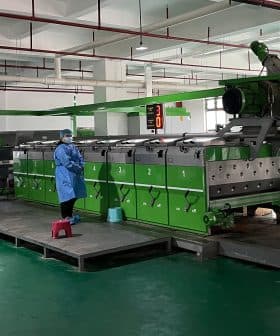Chef Calls Olive Oil "Perfect" for Chinese Cuisine
Chinese cuisine is often considered unhealthy due to its use of MSG and heavy oils, but a well-known chef in Beijing is suggesting the use of olive oil as a healthier alternative. Olive oil is being embraced by families in China for its health benefits, with nutritionists praising its ability to reduce calories, improve metabolism, and lower the risk of cardiovascular disease.
 Chinese cuisine is often regarded as traditional, flavorful and distinctive. An adjective you seldom hear is healthy, mostly due to its reliance on monosodium glutamate (MSG) and heavy use of cooking oils. Soon, however, even the health-conscious may be taking their portions of Peking duck and stir-fried noodles. A well-known chef suggests a different way of preparing Chinese cuisine, one that only involves the introduction of a new ingredient.
Chinese cuisine is often regarded as traditional, flavorful and distinctive. An adjective you seldom hear is healthy, mostly due to its reliance on monosodium glutamate (MSG) and heavy use of cooking oils. Soon, however, even the health-conscious may be taking their portions of Peking duck and stir-fried noodles. A well-known chef suggests a different way of preparing Chinese cuisine, one that only involves the introduction of a new ingredient.
In an interview with Xinhua News, Tian Qiuming, the executive chef of the Great Wall Hotel in Beijing, said that olive oil is perfect for cooking Chinese food. “Apart from use in cold dishes, olive oil is especially suitable for stewing, braising, and earthen pot cooking,” Tian said. “The ingredients don’t absorb large amounts of olive oil as they do with other types, which will help reduce calories.”
In China, olive oil has recently gained popularity due to its health benefits, with families beginning to use the ingredient for cold dishes. The trend has been met with approval from nutritionists, who advise people to try olive oil for recipes that require large amounts of cooking oil.
 In spite of being looked upon as unhealthy, frying remains a popular cooking method for Chinese cuisine. The most common techniques are stir-frying and deep-frying. Tian said that olive oil, which has fewer calories than other oils, is a better choice for frying since it does not break down in higher temperatures. The higher temperatures cause the formation of a protective layer around ingredients. Even when used for deep-frying (or Chau in Chinese), extra virgin olive oil has a higher smoke point (between 240 – 270 degrees Celsius).
In spite of being looked upon as unhealthy, frying remains a popular cooking method for Chinese cuisine. The most common techniques are stir-frying and deep-frying. Tian said that olive oil, which has fewer calories than other oils, is a better choice for frying since it does not break down in higher temperatures. The higher temperatures cause the formation of a protective layer around ingredients. Even when used for deep-frying (or Chau in Chinese), extra virgin olive oil has a higher smoke point (between 240 – 270 degrees Celsius).
Nutritionist Fan Zhihong told Xinhua News that the use of olive oil could also improve metabolism, lower the risk of cardiovascular disease and reduce cholesterol. Fan added that olive oil also has anti-aging properties because it is rich in monounsaturated fat and antioxidants such as carotenoids, chlorophyll
and vitamin E. Olive oil also contains vitamins D (which improves calcium
absorption) and vitamin K (which improves blood circulation and lessens
subcutaneous fat).









